Serving 727 students in grades Kindergarten-8, Research Triangle Charter ranks in the bottom 50% of all schools in North Carolina for overall test scores (math proficiency is bottom 50%, and reading proficiency is bottom 50%).
The percentage of students achieving proficiency in math is 29% (which is lower than the North Carolina state average of 51%). The percentage of students achieving proficiency in reading/language arts is 43% (which is lower than the North Carolina state average of 50%).
The student:teacher ratio of 23:1 is higher than the North Carolina state level of 15:1.
Minority enrollment is 98% of the student body (majority Black), which is higher than the North Carolina state average of 57% (majority Black and Hispanic).
Quick Stats (2025)
- School Type: Charter School
- Grades: Kindergarten-8
- Enrollment: 727 students
- Student:Teacher Ratio: 23:1
- Minority Enrollment: 98%
- Overall Testing Rank: Bottom 50% in NC
- Math Proficiency: 29% (Btm 50%)
- Reading Proficiency: 43% (Btm 50%)
- Science Proficiency: 60-64% (Top 50%)
- Source: National Center for Education Statistics (NCES), NC Dept. of Education
School Overview
Research Triangle Charter's student population of 727 students has stayed relatively flat over five school years.
The teacher population of 32 teachers has declined by 11% over five school years.
School Type
Grades Offered
Grades Kindergarten-8
Total Students
727 students
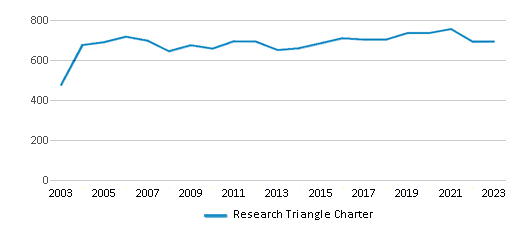
Gender %
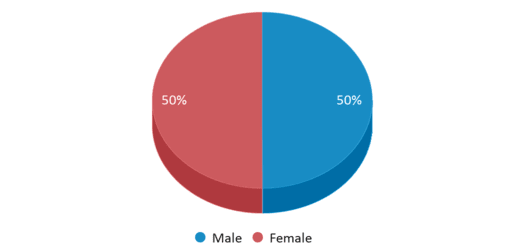
Total Classroom Teachers
32 teachers
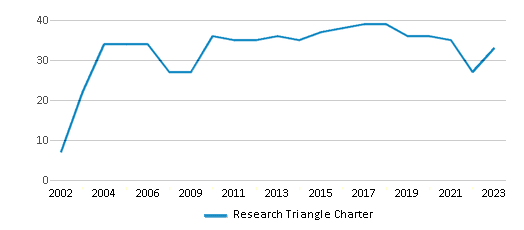
Students by Grade
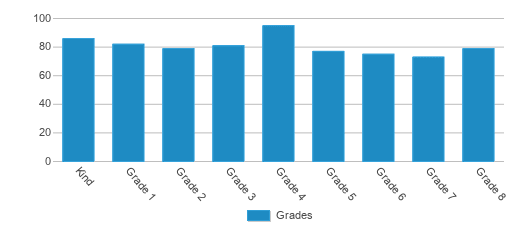
School Rankings
Research Triangle Charter ranks within the bottom 50% of all 2,617 schools in North Carolina (based off of combined math and reading proficiency testing data).
The diversity score of Research Triangle Charter is 0.57, which is less than the diversity score at state average of 0.71. The school's diversity has stayed relatively flat over five school years.
Overall Testing Rank
#1933 out of 2617 schools
(Bottom 50%)
(Bottom 50%)
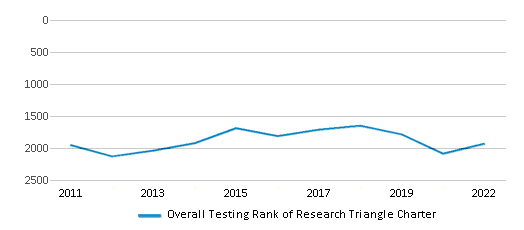
Math Test Scores (% Proficient)
29%
51%
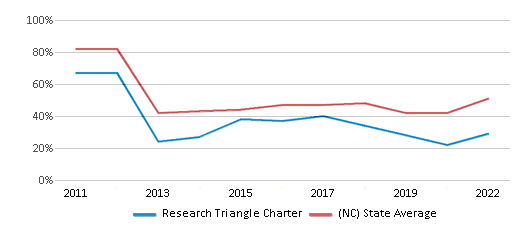
Reading/Language Arts Test Scores (% Proficient)
43%
50%
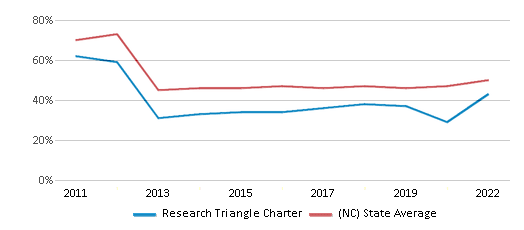
Science Test Scores (% Proficient)
60-64%
63%
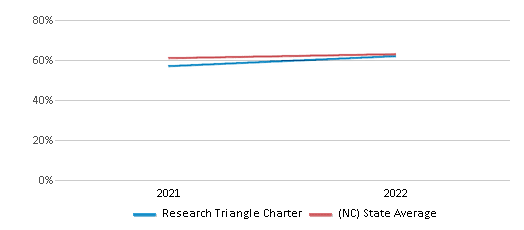
Student : Teacher Ratio
23:1
15:1
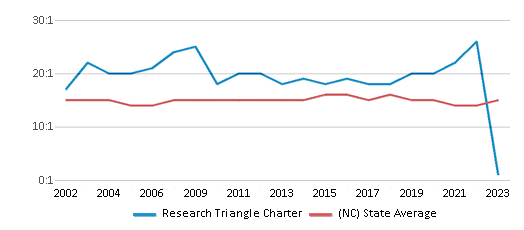
American Indian
n/a
1%
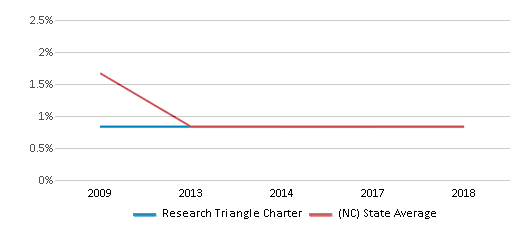
Asian
1%
4%
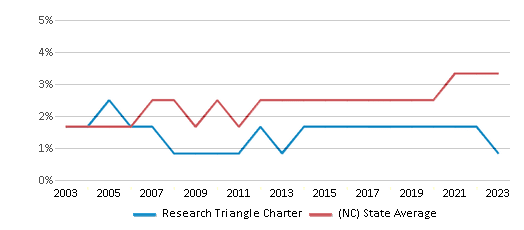
Hispanic
25%
21%
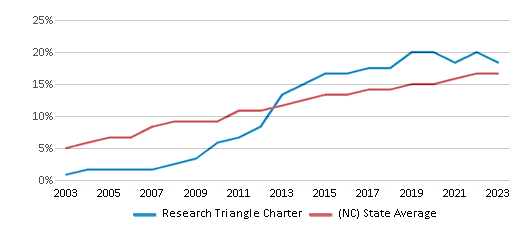
Black
60%
25%
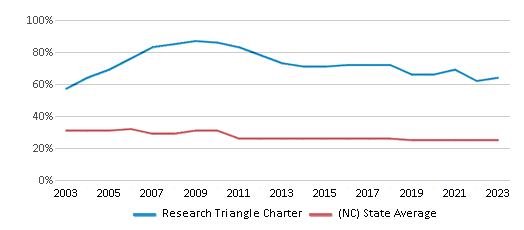
White
2%
43%
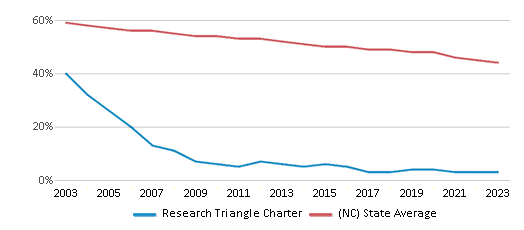
Hawaiian
n/a
n/a
Two or more races
12%
6%
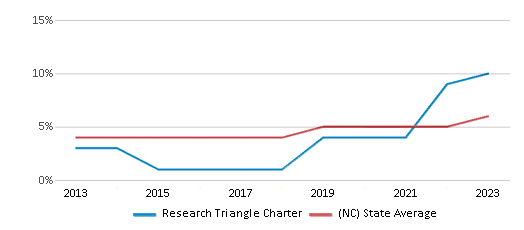
All Ethnic Groups
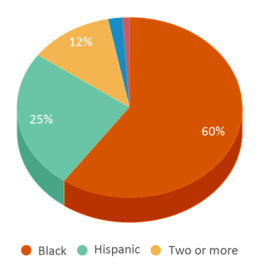
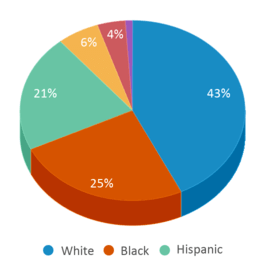
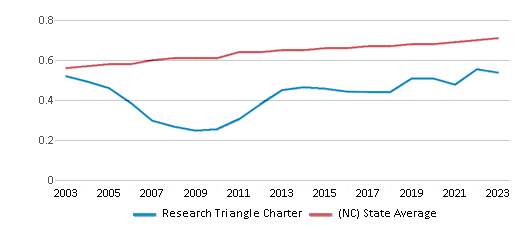
Participates in the National School Lunch Program (NSLP)
Yes
Eligible for Free Lunch
72%
68%
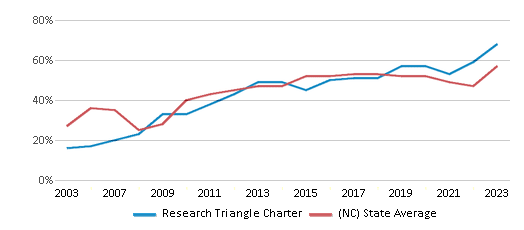
Eligible for Reduced Lunch
5%
1%
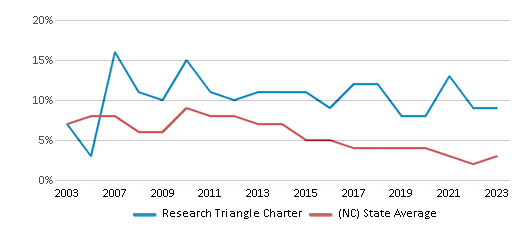
School Statewide Testing
School District Name
Source: National Center for Education Statistics (NCES), NC Dept. of Education
Profile last updated: 02/09/2025
Frequently Asked Questions
What is Research Triangle Charter's ranking?
Research Triangle Charter is ranked #1933 out of 2,617 schools, which ranks it among the bottom 50% of public schools in North Carolina.
What percent of students have achieved state testing proficiency in math and reading?
29% of students have achieved math proficiency (compared to the 51% NC state average), while 43% of students have achieved reading proficiency (compared to the 50% NC state average).
How many students attend Research Triangle Charter?
727 students attend Research Triangle Charter.
What is the racial composition of the student body?
60% of Research Triangle Charter students are Black, 25% of students are Hispanic, 12% of students are Two or more races, 2% of students are White, and 1% of students are Asian.
What is the student:teacher ratio of Research Triangle Charter?
Research Triangle Charter has a student ration of 23:1, which is higher than the North Carolina state average of 15:1.
What grades does Research Triangle Charter offer ?
Research Triangle Charter offers enrollment in grades Kindergarten-8
What school district is Research Triangle Charter part of?
Research Triangle Charter is part of Research Triangle Charter School District.
School Reviews
4 6/16/2023
I was skeptical at the beginning of the year but everything changed after Winter Break. It''s difficult to have a complete picture of the school unless you volunteer or actively participate in various events. Every teacher in the school works hard daily to impact each student and you can see the gratitude in the students'' faces. There are several instructors that spend time with students with behavioral or learning challenges. They have more patience than I remember my teachers had when I was in school lol. I''m excited about my daughter's next year here at RTCA and I will be even more involved in the PTO to ensure our scholars have an even better school year.
5 6/9/2020
Things have changed so much at RTCA in the past few years. They have finished in the top 10% in academic growth in the state in 2018-2019 and even received a 10-year charter renewal from the state—which is very rare! They have raised their school report grade and they have a WONDERFUL middle school with very supportive teachers who understand students'' academic and social-emotional needs. Their middle school dean—Dean Bowser—is a visionary leader who runs a tight ship and has made that middle school a model for others. When you walk in the building, you can feel the love... and that's important to a parent like me. Their leadership is amazing and understanding. I love RTCA! HIGHLY RECOMMENDED!!
2 4/9/2015
When I first heard about RTCA I thought that they were doing great things at their school. I talked to several people who had sent their children/grandchildren there before and they told me to stay clear. After being hardheaded and sending my child to this school I now realize that I made a horrible decision. The leadership lacks proper experience to deal with children. They allow children to jump on weaker children and then when the child defends themselves they kick them out of school.
This school is HORRIBLE when it comes to communicating with parents. If your child has a continuous issue with another child they will not allow you to have a conference with the other parent and child. The assistant principal lacks skills to deal with parents who actually care about their child's well being.
Additionally, the lunch is subpar at best. They have to microwave each "mystery meal" and some days the truck that delivers the meals doesn't even show up.
2 7/9/2013
My son is a rising 7th grader. 6th grade was his first year attending RTCA. I was excited about the academic structure of the school. The smaller class rooms and the individualized attention. I was very disappointed with the teachers. The lack of professionalism and the presence of favortism. The outdoors was not introduced was daily activity. My son rarely saw outdoors. Children need sunshine and play time to ensure their day goes a little bit smoother.
2 3/7/2011
This school needs a lot of work. Specifically, the need for quality teachers. My child has been there since kindergarten and with the exception of that year I have been extremely disappointed. I continue to try and work with them, but continue to be disappointed and wish I had moved my child! My child will definitely not be attending next year.
Review Research Triangle Charter. Reviews should be a few sentences in length. Please include any comments on:
- Quality of academic programs, teachers, and facilities
- Availability of music, art, sports and other extracurricular activities
Recent Articles

What Is A Charter School?
Explore the world of charter schools in this comprehensive guide. Learn about their history, how they operate, and the pros and cons of this educational innovation. Discover key facts about charter schools, including admission policies, demographics, and funding, as well as what to look for when considering a charter school for your child.

10 Reasons Why High School Sports Benefit Students
Discover the 10 compelling reasons why high school sports are beneficial for students. This comprehensive article explores how athletics enhance academic performance, foster personal growth, and develop crucial life skills. From improved fitness and time management to leadership development and community representation, learn why participating in high school sports can be a game-changer for students' overall success and well-being.

February 05, 2025
Understanding the U.S. Department of Education: Structure, Impact, and EvolutionWe explore how the Department of Education shapes American education, from its cabinet-level leadership to its impact on millions of students, written for general audiences seeking clarity on this vital institution.









